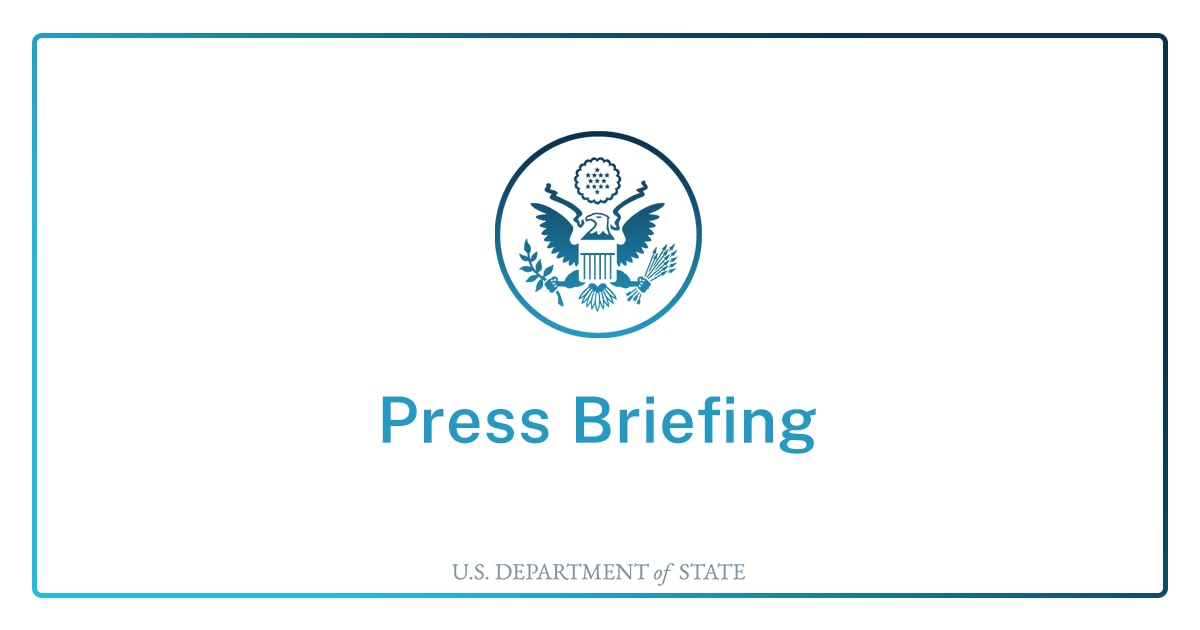
MS JOHNSTONE: Thank you.
MR PRICE: We have consistently spoken about – spoken out against any steps that undercut or – undercut the prospects of a two-state solution or that exacerbate tensions. We have spoken of settlement activity in that context, but again, if we have a specific comment on this development, we’ll let you know.
So until Moscow changes its approach, together with dozens of countries around the world, we’ll continue to provide our Ukrainian partners with what they need on the battlefield, but ultimately to help strengthen their hands at that ultimate negotiating table.
QUESTION: Multiple countries that are at Tier 3, quite a few of them are in Asia, Southeast Asia in particular. And then Macau, of course, was added there. It’s not a country, I think, but it was added there.
MR PRICE: I suppose it’s a good thing I don’t work for the AP. But we can —
QUESTION: Are they published anywhere?
MR PRICE: Sure.
MR PRICE: We remain absolutely committed, and it just so happens that, as record heat waves are striking the world, including in Europe, Secretary Kerry is in Berlin today where Germany, along with many of its neighbors, are experiencing this record heat wave.
Unfortunately, not all countries made such progress. One country was downgraded from Tier 2 to Tier – sorry, from Tier 1 to Tier 2. Ten countries were downgraded from Tier 2 to Tier 2 Watch List, and seven countries and territories were downgraded to Tier 3. The department also made the determination that 11 countries continued to have a government policy or pattern of human trafficking and inadequate enforcement mechanisms. Some government officials in these countries were themselves part of the problem, directly compelling citizens or foreign nationals into sex trafficking, forced labor, or use as child soldiers.
QUESTION: So Russia built the bridge between the – between Russia proper and Crimea.
MR PRICE: Sure.
QUESTION: Yeah, but that point could be tomorrow or it could be five years from now.
QUESTION: Okay. So – and those five were the usual suspects that are always – that are under already existing stringent U.S. sanctions for numerous other things, correct? Like Eritrea, Iran, Sudan, North Korea?
Each year, the TIP Report assesses government efforts based on the efforts that that individual government made during the reporting period from April 1 through the end of March of this year for this year’s report. We saw that unfortunately there was – there were a number of countries this year within that region that did not make the increasing efforts and receive tangible results to stay on the tier that they were on last year and did, in fact, face downgrades.
QUESTION: (Laughter.) I guess. But I mean, he asked you about a deadline and you said of course there’s a deadline.
Said.
This gets back to the point I was making before: No one knows these cases better than the families. So in taking these steps, in considering various steps, we want to make sure that we have the ability, we have the authority that we need to engage in the kind of constructive and comprehensive conversations with the families that we feel that this EO will enable us to do.
On the questions of sanctions, we have previously used a patchwork of sanctions authorities to pursue those responsible for holding Americans, unjustly detaining them or for taking them hostage. We now – and sometimes that has been human rights authorities; sometimes it has been counterterrorism authorities. We now have a direct authority that allows us to pursue – with sanctions, with visa bans – those who are directly or, in some cases, indirectly responsible for ordering the detention, for orchestrating the detention, for maintaining the custody of an American, or for playing a role in the support network that does so. So this is an important authority.
QUESTION: Yeah. So on child protection, Ghana had with the U.S. this initiative which – I’m not quite sure had – did that expire in 2020? And if not, have you selected other countries on the African continent?
MR PRICE: I will leave it – I will leave it to Iran to characterize the status —
QUESTION: — depending on whatever you feel like at the moment. Like, oh, all of a sudden it’s now – Iran’s gone past the line and it’s no longer in our national security interest.
QUESTION: — depending on whatever you feel like at the moment. Like, oh, all of a sudden it’s now – Iran’s gone past the line and it’s no longer in our national security interest.
QUESTION: — depending on whatever you feel like at the moment. Like, oh, all of a sudden it’s now – Iran’s gone past the line and it’s no longer in our national security interest.
QUESTION: — depending on whatever you feel like at the moment. Like, oh, all of a sudden it’s now – Iran’s gone past the line and it’s no longer in our national security interest.
We did not announce sanctions today using this authority in part because we wanted to have discussions not only with partners throughout the U.S. Government but also with the families. We wanted to determine whether sanctions would be the appropriate next step. In some of these cases, sanctions might be; in other cases, sanctions won’t be, at least at this stage.
QUESTION: Can I just ask you about the – your definition of a deadline doesn’t seem to comport with, like, certainly not my editor’s idea of a deadline. Your definition of a deadline is completely subjective and it can change depending on —